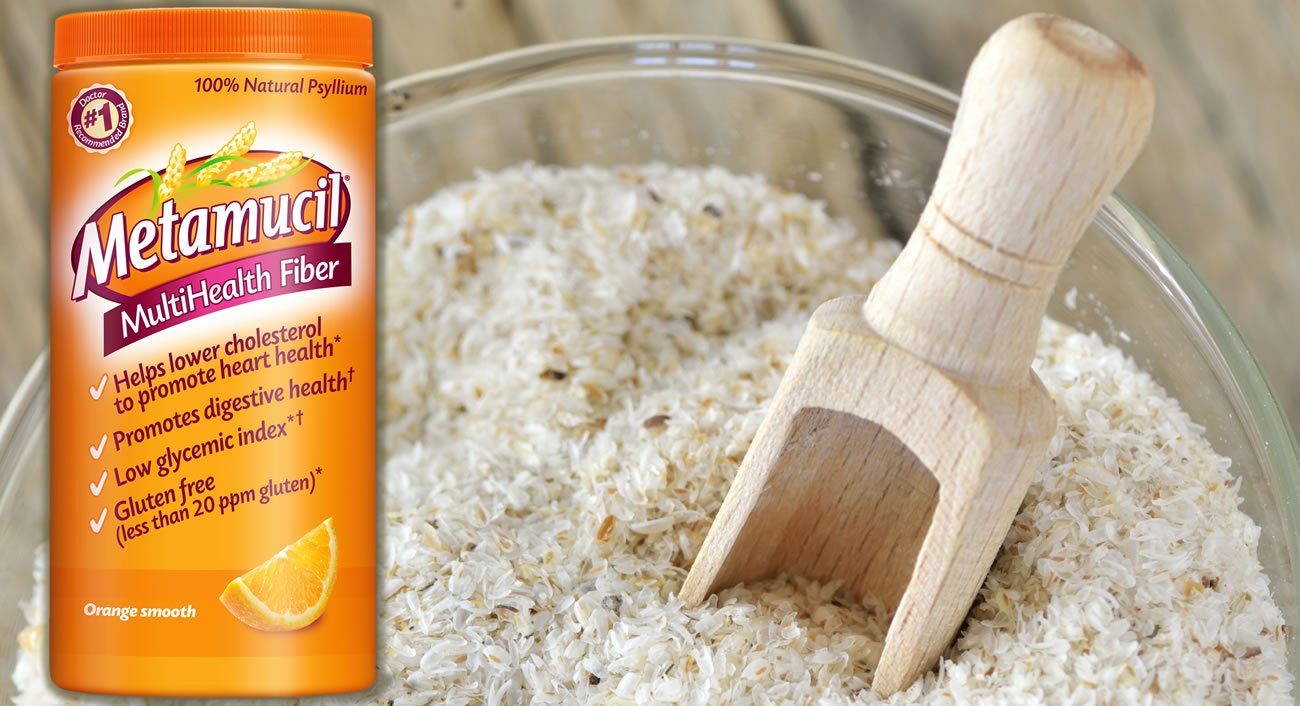Does Metamucil lower LDL cholesterol?
Does Metamucil lower LDL cholesterol? Yes. Does a healthy lifestyle like the Pritikin Program do a much better job of lowering LDL cholesterol? Absolutely. Learn which foods are most effective in lowering LDL cholesterol.

Does Metamucil lower LDL cholesterol?
Yes. But before we go any further, it’s important to understand what Metamucil is.
Metamucil contains powdered psyllium husks, a rich source of soluble fiber.
Psyllium comes from a shrub-like herb called Plantago ovata that grows worldwide but is most common in Asia. Each plant can produce up to 15,000 tiny seeds, from which psyllium husk is derived.

Metamucil is the best-known psyllium product, but psyllium is also available in less expensive store brands of laxatives.
Psyllium can help relieve both constipation and diarrhea, and is used to treat irritable bowel syndrome and other intestinal problems. Psyllium may also help regulate blood sugar levels in people with diabetes.
Studies have shown that psyllium can lower both total and LDL (bad) cholesterol levels, which may help reduce the risk of heart disease.
How much does Metamucil lower LDL cholesterol?
In a meta-analysis1 of 8 studies involving 384 people with high cholesterol levels who had been following a low-fat diet for several weeks, adding psyllium supplementation lowered LDL cholesterol an additional 7%.
Another well-designed study,2 from the Veterans Affairs Medical Center in Lexington, Kentucky, found that 197 people who had been taking psyllium for 6 months netted LDL cholesterol levels that were 6.7% lower than the 51 people in the placebo group.

Learn More About Pritikin
What dosage should I take?
In general, each 2 grams of soluble fiber added to a diet will lower LDL cholesterol by about 1%, or maybe a bit more.
In the above meta-analysis, the dosage used to achieve the 7% drop in LDL was 10.2 grams of psyllium daily, which is the equivalent of about 3 teaspoons daily of Sugar-Free Metamucil.
The dosage in the Veterans Affairs study was the same – 10.2 grams daily.
If you’re purchasing fiber supplement brands other than Metamucil, make sure they’re psyllium-based, not cellulose-based.
When should I take Metamucil?
To get the cholesterol-lowering benefit, take 1 teaspoon of Sugar-Free Metamucil with a full glass of water no more than 15 to 30 minutes before a meal.
The psyllium needs to be in your GI tract the same time as your meal. Once it reaches your stomach, it starts dissolving into a gel-like substance. It binds with the bile acids that form cholesterol, and in doing so, “mops” up cholesterol. More cholesterol ends up in your bowel movements, and less ends up being reabsorbed in the blood.

Are there any side effects to taking Metamucil?
It’s generally a good idea to add Metamucil to your diet gradually. Otherwise, digestive complications like stomach pain, gas, constipation, and diarrhea may occur.
Is Metamucil the best natural, prescription-free remedy for high cholesterol levels?
No. “Don’t ever think that Metamucil is a one-shot deal – something that in and of itself can miraculously clear up cholesterol problems,” points out Kimberly Gomer, Director of Nutrition and Educator at the Pritikin Longevity Center.
“What’s most effective in terms of improving LDL blood cholesterol and heart health is comprehensive lifestyle changes, particularly dietary changes, that involve eating a lot more fiber-rich, whole foods like fruits, vegetables, legumes (beans), and whole grains, and a lot less saturated fat and trans fat.”
Foods with saturated fat include butter, fatty flesh like red meat, full-fat and low-fat dairy products, palm oil, and coconut oil.
Trans fats are found in some margarines and many snack (junk) foods like fries, donuts, cookies, and crackers. If you see partially hydrogenated fat or oil in the Ingredient List of a food label, that food has trans fats.
Other lifestyle changes that help reduce total and LDL cholesterol include:
- Losing excess weight
- Eating fewer refined sugars (especially fructose)
- Eating fewer refined grains (such as white flour)
- Exercising regularly
Pritikin Program
A lifestyle plan that embodies all the above dietary and other lifestyle recommendations is the Pritikin Program.
The impact of the Pritikin eating and exercise program on total and LDL cholesterol levels is profound. In peer-reviewed research3 on more than 4,500 men and women, the Pritikin lifestyle was found to lower total cholesterol by 23% and LDL cholesterol by 23%, and within 3 week’s time.
Among children (both normal and overweight) with high cholesterol levels, recent research has found that adopting the Pritikin Program reduced LDL cholesterol by 25% in the overweight youth and 29% in the normal-weight youth in 2 weeks.4
“The other benefit of a Pritikin lifestyle is that you’re not only lowering your LDL cholesterol, you’re improving many other things that affect your heart, including your blood pressure, glucose levels, triglyceride levels, and body weight. All these factors add up to optimal protection against a heart attack and other cardiovascular problems,” summarizes Kimberly Gomer, MS, RD, Director of Nutrition at the Pritikin Longevity Center in Miami. The health resort has been teaching the Pritikin Program since 1975.
“And you just feel better, too,” smiles dietitian Kimberly Gomer. “There’s no way you’d ever get all these benefits from a few spoonfuls of Metamucil every day.”
More Sources of Soluble Fiber
Keep in mind, too, that psyllium is not the only fiber that helps lower cholesterol levels. All soluble fibers can help reduce LDL cholesterol. Foods naturally rich in soluble fiber include:
- Beans and peas (legumes) – all beans, such as pinto beans, red beans, garbanzo beans, and soybeans (edamame)
- Yams, plus sweet potatoes and other potatoes
- Oats, such as oatmeal and oat bran
- Barley
- Berries – all berries, such as raspberries, blueberries, blackberries, and strawberries
- Vegetables such as carrots, beets, okra, and eggplant
The Pritikin Eating Plan recommends all the above soluble-fiber-rich foods.
What about a combination of Metamucil with a healthy lifestyle like Pritikin?
That’s certainly an option. Several studies have found that psyllium therapy is an effective adjunct to healthy dietary recommendations like the Pritikin Eating Plan.
In one study,5 for example, researchers divided overweight and obese individuals into 4 different groups:
- Group 1 followed a healthy, fiber-rich diet.
- Group 2 ate their normal diet but added a psyllium supplement.
- Group 3 consumed a healthy, fiber-rich diet plus the psyllium supplement.
- Group 4 (the control group) simply swallowed a placebo.
After 3 months, the scientists found that adding psyllium fiber supplementation to a normal diet was sufficient to obtain beneficial effects in metabolic risk factors like cholesterol and glucose levels. However, a psyllium supplement plus a healthy, fiber-rich diet “provided the greatest improvements in metabolic syndrome risk factors,” concluded the authors.
Plant Sterols
Other non-prescription sources that researchers have found helpful in lowering blood cholesterol are plant sterols and stanols.
Plant sterols and stanols are naturally occurring in whole plant foods like vegetables, fruits, whole grains and beans, but are also available in fortified foods (everything from orange juice to margarines) as well as supplements, such as Cholest-Off.
Among these products, a supplement like Cholest-Off is preferable over the fortified foods because with the Cholest-Off you’re getting just the sterols and stanols, not the extra calories, fats, salt, and sugars of most foods enriched with plant sterols.
In 2003, scientists at the University of Toronto studied the effects of a dietary plan based on a “portfolio” of cholesterol-lowering foods,6 particularly whole foods naturally rich in soluble fiber but also a few servings daily of foods fortified with plant sterols. They found that the diet was just as effective as statins in lowering LDL cholesterol.
Summing Up…
Does Metamucil lower LDL cholesterol? Yes. Does a healthy lifestyle like the Pritikin Program do a much better job of lowering LDL cholesterol? Absolutely.
Bottom Line: “Don’t settle for the piecemeal approach, like taking a few teaspoons of Metamucil daily, and doing little else to improve your heart health. Piecemeal approaches will likely give you piecemeal results,” counsels Pritikin’s Medical Director, Dr. Danine Fruge.
“Achieving small benefits is perfectly fine for many endeavors in life, but this is your heart. You want the biggest and best benefits there are. You want a lifestyle like Pritikin that can alter dramatically your risk of suffering a heart attack.”
If your LDL levels are still high after trying a lifestyle like Pritikin in combination with supplements like Metamucil and Cholest-Off, “do talk to your doctor about adding cholesterol-lowering medications like statins,” recommends Dr. Fruge.
“The use of medication, when appropriate, can be beneficial, but it should be an adjunct to lifestyle rather than replace our personal responsibility for our own health.”

Get All the Details of a Stay at the Pritikin Center in Your Inbox
Sources
- 1 American Journal of Clinical Nutrition, 2000; 71 (2): 472.
- 2 American Journal of Clinical Nutrition, 2000; 71 (6): 1433.
- 3 Archives of Internal Medicine, 1991; 151 (7): 1389.
- 4 American Journal of Physiology: Regulatory, Integrative & Comparative Physiology, 305(5): R552-7, 2013.
- 5 British Journal of Nutrition, 2011; 105 (1): 90.
- 6 JAMA, 2003; 290 (4): 502.
Wellness Resort
Weight Loss Retreat
Health Spa